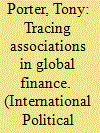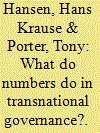|
|
|
Sort Order |
|
|
|
Items / Page
|
|
|
|
|
|
|
| Srl | Item |
| 1 |
ID:
142234


|
|
|
|
|
| Summary/Abstract |
While the importance and key features of transnational benchmarking have received increased attention in recent years, the organisational contexts of this benchmarking have not yet been analysed systematically enough. Drawing on actor-network theory, this article identifies two key aspects of these contexts. The first is embeddedness, which refers to the degree to which there are networks that carry information and action from the benchmark to its contexts and back that are sustained institutionally, including by technical artefacts, objects, and routine local practices. Embeddedness is critical to the effectiveness of benchmarking. The second is publicness, which refers to the degree to which these networks exhibit expanding flows of information across widening circles of engagement, or instead are marked by control, domination, and exclusion. The article argues that benchmarking as a form of governance has an inherent impetus toward greater publicness, although this can be prevented by self-interested actors or problems associated with embeddedness. The article then explores the relevance of these conceptual points by examining cases of transnational benchmarking: disaster risk reduction and supply chain management.
|
|
|
|
|
|
|
|
|
|
|
|
|
|
|
|
| 2 |
ID:
124428


|
|
|
|
|
| Publication |
2013.
|
| Summary/Abstract |
Four decades ago, when financial globalization was attracting widespread attention, the few theoretical frameworks that were available to analyze it were relatively simplistic. Often, it was seen as an unstoppable quasi-natural expression of the expansion of market forces, operating independently of state power, which it was undermining. Today there is a rich variety of frameworks which help us understand the immensely complex entanglements of power, states, markets, and international institutions that constitute and govern global finance, including some insightful uses of actor-network theory (ANT) (for instance, Langley 2006; Best forthcoming 2013). In this contribution I highlight a number of unique contributions that ANT makes to our understanding of global finance.
|
|
|
|
|
|
|
|
|
|
|
|
|
|
|
|
| 3 |
ID:
151673


|
|
|
|
|
| Summary/Abstract |
Two paradoxes associated with big data are relevant to global governance. First, while promising to increase the capacities of humans in governance, big data also involve an increasingly independent role for algorithms, technical artifacts, the Internet of things, and other objects, which can reduce the control of human actors. Second, big data involve new boundary transgressions as data are brought together from multiple sources while also creating new boundary conflicts as powerful actors seek to gain advantage by controlling big data and excluding competitors. These changes are not just about new data sources for global decision-makers, but instead signal more profound changes in the character of global governance.
|
|
|
|
|
|
|
|
|
|
|
|
|
|
|
|
| 4 |
ID:
130913


|
|
|
|
|
| Publication |
2012.
|
| Summary/Abstract |
This study examines how numbers in transnational governance constitute actors, objects, and relationships, including relationships of power. We review the existing literatures on numbers for insights relevant to their role in transnational governance, including the ontology of numbers, the history of numbers and their role in governance. On this basis, we set out the main distinctive ways that numbers are implicated in transnational governance. We conclude that studies of transnational governance would benefit from paying more attention to the much overlooked performative role of numbers in governance processes. Numbers have properties that differ from words, and shifts from one to the other in governance, for instance in the displacement of laws or norms with risk models or rankings based on numbers, have particular effects, including political effects on states, firms, individuals, and other actors and institutions.
|
|
|
|
|
|
|
|
|
|
|
|
|
|
|
|
| 5 |
ID:
165592


|
|
|
|
|
| Summary/Abstract |
The cross-border impacts of whistleblowing recently have become far more visible and consequential, as evident with the ‘Paradise’ and ‘Panama Papers’ leaks, which exposed tax and other financial wrongdoings of prominent personalities around the world, leading to scandals, resignations and prosecutions. Despite its new prominence, whistleblowing often continues to be seen as a series of ad hoc chance acts. We argue instead that whistleblowing is an increasingly institutionalized regulatory tool that is enabled by an emergent ‘whistleblowing system’, with similarities to other new forms of informal global governance. Whistleblowing can be controversial, and we develop a framework for assessing whether any particular whistleblowing event and the system that enables it are in the public interest. We then apply this analysis to the case of global tax evasion. We conclude that a whistleblowing system can make important contributions to difficult cross-border regulatory challenges such as tax evasion, especially where other governance systems fail.
|
|
|
|
|
|
|
|
|
|
|
|
|
|
|
|
|
|
|
|
|